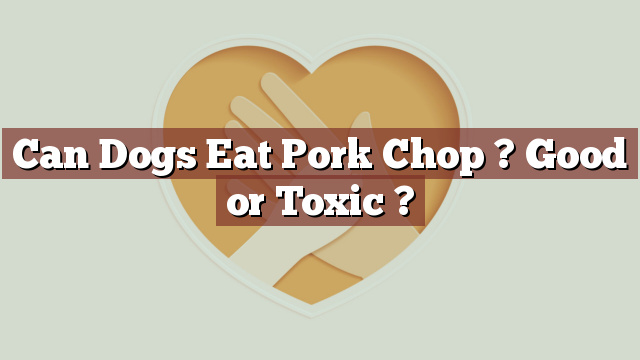Can Dogs Eat Pork Chop? Good or Toxic?
As responsible pet owners, it is crucial to be aware of what foods are safe for our furry friends to consume. One common question that arises is whether dogs can eat pork chop. In this article, we will explore the nutritional value of pork chop, safety considerations and potential risks, as well as provide guidance on what to do if your dog eats pork chop.
Nutritional Value of Pork Chop: Proteins, Fats, and Minerals
Pork chop is a rich source of proteins, fats, and minerals. Proteins are essential for dogs as they contribute to muscle development and overall growth. Fats, when consumed in moderation, provide a concentrated source of energy for our canine companions. Additionally, minerals found in pork chop, such as zinc and selenium, play a vital role in supporting a healthy immune system and promoting proper cellular function.
Can Dogs Eat Pork Chop? Safety Considerations and Risks
It is generally safe for dogs to eat pork chop, but there are certain considerations and risks to be aware of. Firstly, it is important to ensure that the pork chop is cooked thoroughly, as raw or undercooked pork can contain harmful bacteria like salmonella or trichinella. These bacteria can cause food poisoning in dogs, resulting in symptoms such as vomiting, diarrhea, and abdominal pain.
Furthermore, the seasoning and preparation methods used in cooking pork chop can also pose risks to dogs. Ingredients like onions, garlic, or excessive salt can be toxic to dogs and should be avoided. Additionally, bones from pork chop can be a choking hazard or cause internal injuries if ingested.
Consulting with a veterinarian is recommended before introducing pork chop or any new food into your dog’s diet, especially if your dog has pre-existing health conditions or allergies.
Potential Risks or Benefits: Digestive Issues and Pancreatitis
While pork chop may be safe for dogs to consume in moderation, it can still pose potential risks. The high-fat content in pork chop can lead to digestive issues such as pancreatitis in some dogs. Pancreatitis is an inflammation of the pancreas and can cause symptoms like vomiting, abdominal pain, and loss of appetite. Dogs with a history of pancreatitis or those predisposed to the condition should avoid consuming pork chop altogether.
What to Do If Your Dog Eats Pork Chop: Monitoring and Care
If your dog accidentally consumes pork chop, it is essential to monitor them for any signs of distress or digestive issues. Keep an eye out for symptoms such as vomiting, diarrhea, or abdominal pain. If any concerning symptoms occur, it is crucial to contact your veterinarian for further guidance and advice.
In general, it is best to avoid feeding your dog large amounts of pork chop or any fatty foods. Moderation is key, and it is important to balance your dog’s diet with appropriate canine-friendly foods that meet their nutritional requirements.
In Conclusion: Limited Pork Chop Consumption with Caution
In conclusion, dogs can eat pork chop, but it should be done with caution. Moderation is important, and it is essential to ensure that the pork chop is fully cooked and free from harmful seasonings. Dogs with a history of pancreatitis or those prone to digestive issues should avoid pork chop altogether.
As responsible pet owners, it is our duty to prioritize our dog’s health and well-being. Regularly consulting with a veterinarian and being mindful of the foods we share with our furry companions is vital to their overall health and happiness.
Thank you for investing your time in exploring [page_title] on Can-Eat.org. Our goal is to provide readers like you with thorough and reliable information about various dietary topics. Each article, including [page_title], stems from diligent research and a passion for understanding the nuances of our food choices. We believe that knowledge is a vital step towards making informed and healthy decisions. However, while "[page_title]" sheds light on its specific topic, it's crucial to remember that everyone's body reacts differently to foods and dietary changes. What might be beneficial for one person could have different effects on another. Before you consider integrating suggestions or insights from "[page_title]" into your diet, it's always wise to consult with a nutritionist or healthcare professional. Their specialized knowledge ensures that you're making choices best suited to your individual health needs. As you navigate [page_title], be mindful of potential allergies, intolerances, or unique dietary requirements you may have. No singular article can capture the vast diversity of human health, and individualized guidance is invaluable. The content provided in [page_title] serves as a general guide. It is not, by any means, a substitute for personalized medical or nutritional advice. Your health should always be the top priority, and professional guidance is the best path forward. In your journey towards a balanced and nutritious lifestyle, we hope that [page_title] serves as a helpful stepping stone. Remember, informed decisions lead to healthier outcomes. Thank you for trusting Can-Eat.org. Continue exploring, learning, and prioritizing your health. Cheers to a well-informed and healthier future!

